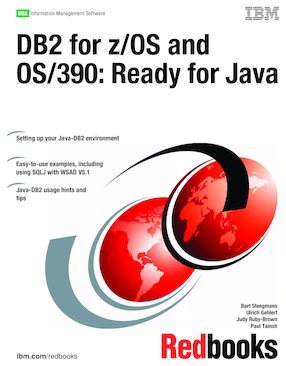DB2 for z/OS and OS/390: Ready for Java
An IBM Redbooks publication
Note: This is publication is now archived. For reference only.

Published on 03 December 2003, updated 22 December 2004
ISBN-10: 0738427853
ISBN-13: 9780738427850
IBM Form #: SG24-6435-00
Authors: Bart Steegmans, Ulrich Gehlert, Judy Ruby-Brown and Paul Tainsh
The earth is flat!
The earth is the center of the universe!
Men shall never fly!
Java will never work properly on the mainframe!
All four statements had a lot of advocates for a long time, but all of them turned out to be wrong.
In this IBM Redbooks publication we show how Java and DB2 for z/OS and OS/390 can work together and form a strong combination that can run your mission-critical enterprise applications. This publication focusses on the new IBM Universal Driver for SQLJ and JDBC, IBM’s new JDBC driver implementation, supporting both Type 2 and Type 4 driver connectivity to the members of the DB2 family, including DB2 for z/OS, and DB2 for Linux, Unix and Windows.
This publication provides guidance on the different ways to set up your environment to hook a Java program up to a DB2 for z/OS subsystem, through JDBC or SQLJ, using the Type 2 driver and the Type 4 driver.
We provide an SQLJ tutorial, and demonstrate how to develop and deploy SQLJ programs using the new SQLJ support functions that became available with WebSphere Studio Application Developer V5.1.
We demonstrate the use of Java and DB2 using native Java programs, as well as through the use of Servlets and JSPs running on a WebSphere Application Server.
Part 1. Introduction
Chapter 1. A brief history of Java
Chapter 2. An introduction to Java 2 Enterprise Edition
Chapter 3. Accessing DB2 from Java
Part 2. Prerequisites and setup
Chapter 4. Products and levels - Now and soon
Chapter 5. Setup
Part 3. Putting it all together
Chapter 6. Getting started with JDBC
Chapter 7. JDBC revisited
Chapter 8. Getting started with SQLJ
Chapter 9. The SQLJ program preparation process
Chapter 10. SQLJ tutorial and reference
Chapter 11. SQLJ revisited
Chapter 12. The DB2 Universal Driver
Chapter 13. Performance topics
Chapter 14. Error handling and diagnosis
Part 4. Accessing DB2 from Web applications
Chapter 15. Using Servlets to access DB2
Chapter 16. JavaServer Pages
Part 5. Appendixes
Appendix A. SQLSTATE categories
Appendix B. Source code of sample programs
Appendix C. Additional material